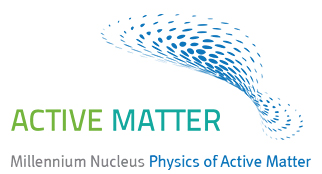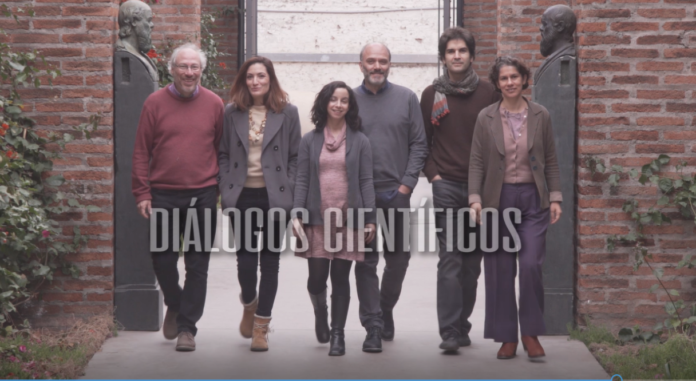• Genetic edition, human impact on the planet earth and how a living being is formed are the subjects addressed in the three chapters that will be launched and reproduced by Qué Pasa magazine in August.
Will a genetic edited human being be able to transfer its DNA changes to its offspring? Are we living in a new geological era marked by human action? What can tell us the way an embryo is developed about diseases like cancer? These are some of the questions presented in the second season of the series Scientific Dialogs, created by the Millennium Nucleus Physics of Active Matter of the Physics Department of the University of Chile and financed by the Millennium Initiative.
The series that will be transmitted by quepasa.cl this year, calls the attention because the physicists of the Millennium Nucleus interview their peers from other areas in a scientific dissemination exercise that looks to approach the work made inside and outside the Millennium Nucleus to the general public. Besides, this work seeks to enhance the spread of science among the researchers and position them as relevant actors when we talk about knowledge.
“Scientific Dialogs has been a very interesting opportunity to understand about other scientific subjects outside of our physics comfort zone. To prepare the talks, we have had to study, which is always challenging but very attractive. The idea is that the public perceives that interest and motivation and makes them want to study and learn about the multiple current scientific developments and our job”, says Rodrigo Soto, Director of the Millennium Nucleus Physics of Active Matter.
The chapters of this season are: “CRISPR: A revolution in genetic edition” (Rodrigo Soto, Director of the Millennium Nucleus interviews Florencia Tevy, Ph.D. in Genomics), “Embryonic development; How a human being is formed” (María Luis Cordero, Alternate Director of the Millennium Nucleus interviews Miguel Concha, Ph.D. in Biomedical Science) and “Anthropocene: The impact of the human being on earth” (Felipe Barra, Associate Researcher of the Millennial Nucleus interviews Maisa Rojas, Climatologist).
Today we launched the series trailer. You can see it in quepasa.cl or on our YouTube channel:
https://youtu.be/dhaj6II04EU
THE CHAPTERS
“Embryonic development; How a human being is formed”
Miguel Concha, Professor of the Medicine Faculty of University of Chile and Researcher of the Biomedical Neuroscience Millennium Institute (BNI) and Millennium Nucleus Physics of Active Matter talks about a vital stage in our life: the embryonic development.
“We talked about how the embryo is formed starting from one cell, the mechanical forces’ role in this process, the mother cells role and its potential use in the current medicine, the ethical aspects that raised when we talk about the embryonic development manipulation, and the experimental work that we do in the physics of active matter area”, Concha, says.
“Anthropocene: The impact of the human being on earth”
Maisa Rojas, Ph.D. in Atmospheric Physics, Climatologist and Director of the Climate Science and Resilience Center (CR2) located in the Physics and Mathematics Science Faculty of the University of Chile explains what the Anthropocene is and says we are living in an era marked by the effects of the human being on this earth including climate change, her area of expertise.
“In this chapter, we are going to be able to understand the physics in climate change and comprehend this impact goes beyond greenhouse gases. Climate change has some consequences that are already irreversible and others that are still reversible. There is a lot to do to change the course and when we make it, there are going to appear a lot of opportunities. This message is not intended to be catastrophic, is about hope and opportunities”, says Rojas.
“CRISPR: A revolution in genetic edition”
Florencia Tevy, Ph.D. in Genomics, CEO of the GEDIS Biotech and member of the RedI (a female network of researchers) tells us about the CRISPR-Cas 9, the new genetic edition tool and where this area is going to. “It is required to communicate and form people about an area that is going to affect the conservation of the biodiversity, generate tools to maintain the production of the agroforestry sector and that it will affect human rights, since we are only a step away from having to debate and legislate about our new human rights”, says Tevy.
Quépasa.cl in its online channel will emit the chapters of Scientific Dialogs in an unprecedented partnership with the Millennium Nucleus. Patricio Lazcano, Science Editor of La Tercera newspaper and quepasa.cl said: “It is an honor for Qué Pasa to count with this series in which Chilean Scientists from different areas participate since it allows to add quality resources to our daily task: to bring Science, its investigations and developments closer to people”
Rodrigo Soto, Director of the Millennium Nucleus thanks this partnership, space and the permanent commitment this media has always have with science and technology: “I invite to all the people, especially young people to see this season of Scientific Dialogs”.
Outreach Importance
“As scientists we investigate in order to generate new knowledge that allows us to understand nature, is important that this new knowledge is available not only for the scientific community and the engineers that will look for applications but also for the public so they can be amazed by understanding how the nature works and comprehend how the world will be in the future”, Rodrigo Soto, Director of the Millennium Nucleus Physics of Active Matter
It was very interesting to be part of this. I value the fact of being able to communicate the science we make to the general public. Is a need and an obligation to do it since, as scientists, we have a social role that we must assume actively”, says Miguel Concha, Doctor in Biomedical Sciences of the University of Chile.
Is not always easy for a scientist to find the space or the time to spread science. We complain about the people’s lack of interest, but we are responsible to spread out the knowledge we generate. This is our contribution. I hope it gets to a good amount of people and they can be interested as much as us”. María Luisa Cordero, Alternate Director of the Millennium Nucleus.
“It was very fun to be interviewed by a scientist because, even though we are not experts in communication, we have another kind of questions, another way to approach to science, so I liked the interest showed in the questions made by my partners”, Maisa Rojas, Climatologist of the University of Chile and Director of the Climate Science and Resilience Center (CR2).
“We are in a social moment in which everything is science. It is necessary to communicate what we do inside the laboratory to all the community, including our peers from other areas, kids and decision-makers. This way we are going to find the ways to reach a sustainable development”, Florencia Tevy, Ph.D. in Genomics.
“Scientific Dialogs has been a fun experience that has shown us how hard is to communicate science to the general public. We have a lot to learn to improve the science spread. We have been looking for subjects that have to do with the challenges society has today and the invitation is to make oneself questions about these subjects, present them and deepen even more, because, the better we understand, the better we react”, Felipe Barra, Associate Researcher of the Millennial Nucleus and Director of the Physics Department of the FCFM of the University of Chile.


